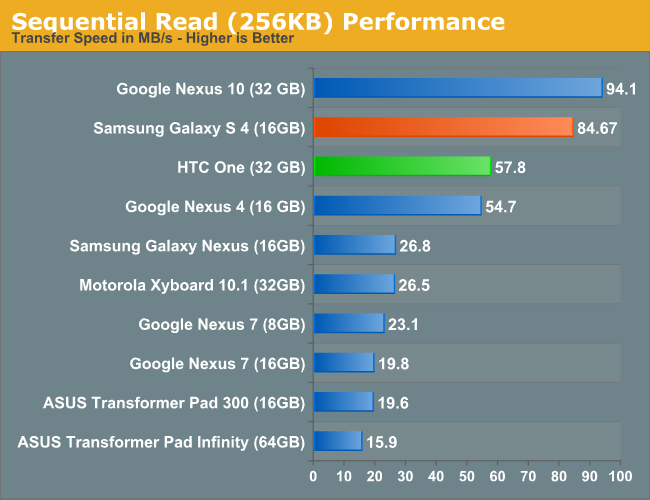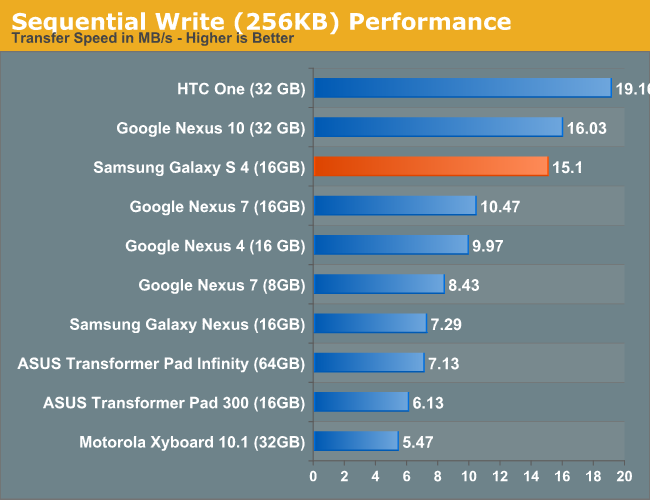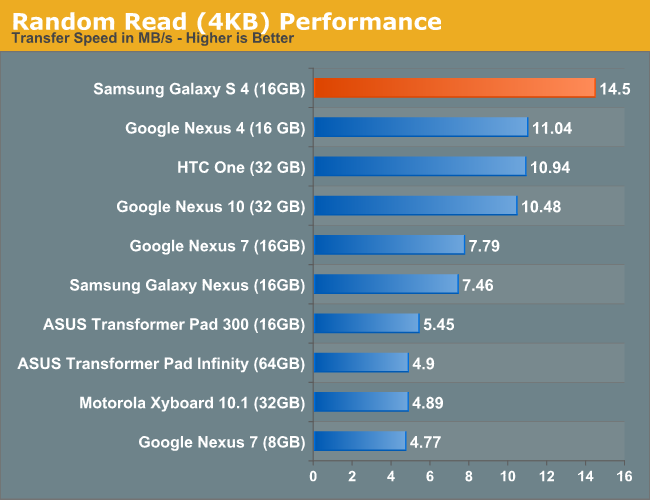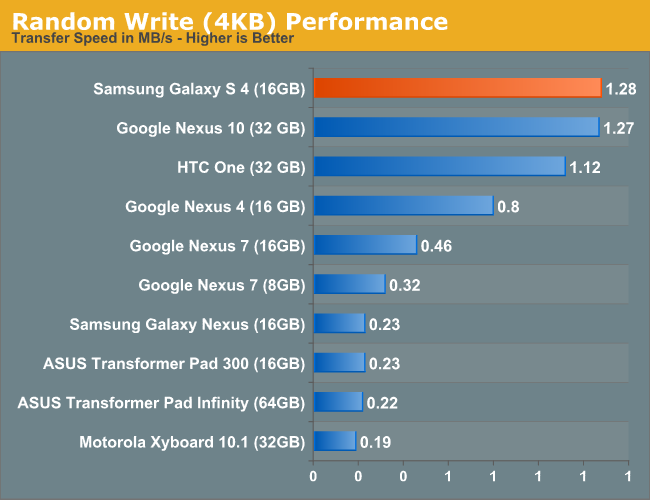Samsung Galaxy S 4 Review - Part 1
by Brian Klug on April 24, 2013 12:01 AM ESTNAND Performance
The Galaxy S 4 ships with either 16GB or 32GB of NAND on-board, but allows for expansion via a microSD card slot. The latter is a quickly disappearing feature on modern smartphones, but it remains a point of differentiation offered by Samsung. We were sampled a 16GB version of the Galaxy S 4, which arrived with 9.62GB of usable space after the OS and app pre-load.
As always we're using Androbench (with modified settings) to quantify NAND performance. Thankfully NAND performance has been steadily improving on modern smartphones/tablets, and the Galaxy S 4 is no exception. Sequential read performance actually sees a tremendous boost compared to most of the other devices in our charts here. Optimizing for sequential read performance makes a lot of sense, but it's good to see Samsung being competitive on all fronts here.
It is worth pointing out that NAND is treated very much as a commodity in these devices, and it's entirely possible that you'll see performance deviate from what we've shown here depending on what controller/NAND/firmware combination you get in your device.














335 Comments
View All Comments
mayankleoboy1 - Wednesday, April 24, 2013 - link
1. Out of the box, how does SGS4 display compare to HTC one ?2.This review feels a bit cramped, mainly because Samsung/QC hasnt given much info on the SoC. (To be clear, the reviewer cant do much here).
netmann - Wednesday, April 24, 2013 - link
Apple iPhone 5, Google Nexus 4, HTC One, Samsung Galaxy S4....they all being reviewed at AnandTech while Nokia Lumia 920 keep getting ignored!?aelwyn - Wednesday, April 24, 2013 - link
Because, with the exception of the iPhone, they're comparing Android phones. People interested in the S4 are probably not even considering a Windows phone. The iPhone is included simply because, right or wrong, it's the benchmark against which other smartphones are measured.kyuu - Wednesday, April 24, 2013 - link
He was talking about the phones actually getting reviewed, not their inclusion or exclusion from the charts in this article.Quite a while ago a Lumia 920 review was supposed to have been in the works, but it never materialized and I have never seen an explanation for why it was (apparently) canned. Maybe we'll get a review of the 928, which, despite a few change-ups, is largely identical.
maximumGPU - Thursday, April 25, 2013 - link
indeed, we were promised a 920/HTC 8X review and never got one. I think it's a bit unfair towards the windows phone community.jeffkibuule - Thursday, April 25, 2013 - link
Windows Phone 8X: http://www.anandtech.com/show/6692/from-mango-to-a...I think what you really want is an in depth review of the 920, but from a hardware standpoint, there's little remarkably new about either when it was released or now. Perhaps it would have been more honest to have a review of Windows Phone 8 in general, but there's not much new to show for it.
val580 - Wednesday, April 24, 2013 - link
18 unread sms and 23 missed calls :-) wish I had that number of girlfriends lolbmgoodman - Wednesday, April 24, 2013 - link
Many of you will regret buying this phone with Android 5 rolling out in the coming weeks! Trust me, as a Galaxy S2 owner, I know only too well how many upgrades that Samsung/AT&T combined to totally bork my phone! The worst was the "Sleep of Death" that was added in 4.0.4 and took nearly 4 months to correct. Then there were other "features", like not reconnecting to the wifi after waking the phone, potentially using LOTS of extra data from your cellular data plan. Samsung has also stopped providing technical information to the developer community and many of the custom ROM developers are giving up. There is *still* not a stable version of CyanogenMod based on Android 4.1 for the Galaxy S2, for example.Sure, there's a lot I love about my phone, but I'm reluctant to buy another Samsung. That said, if you're happy with 4.2.2, and you can manage to keep Samsung from "upgrading" you, you may well be pleased with the phone for a few years. (I won't even get into hardware reliability, other than to say that my phone is now exhibiting some strange minor Bluetooth issues.)
Gray05 - Wednesday, April 24, 2013 - link
If you don't run custom ROMs, you are likely going to wait a long time to get updates. And just like the version the phone ships with, the updates suck. That is reality. From what I see, that is independent of what carrier/OEM you use.If you insist on using CyanogenMod as your ROM, ok. But there are plenty of stable ROMs out for the S2.
sigmatau - Thursday, April 25, 2013 - link
I am extremely leery about Samsung. I've owned a GS2 and hated it. It had a hesitation issue with the UI and I have noticed it in the GS3 too. I find it annoying having to wait for it to flip my screen when I want to type an email. It seemed like a second too late and I found myself shaking the phone to try to activate it. The lock screen was beyond stupid where you couldn't set a time before it would ask for your PIN. There were the options in the settings, but they didn't work.And don't start me on the fail built in email. I use my phone for work and find myself typing many emails on it. My GS2 would crash so much during email typing that I had to throw it one day. So much lost time on that POS. Samsung also took about a year to upgrade it to ICS even though it came out a month after the US's release.
Then there were random times that my SD card would be wiped randomly and all my music with it. It's fairly annoying having to reload almost 20 GBs of music on those slow memory sticks.